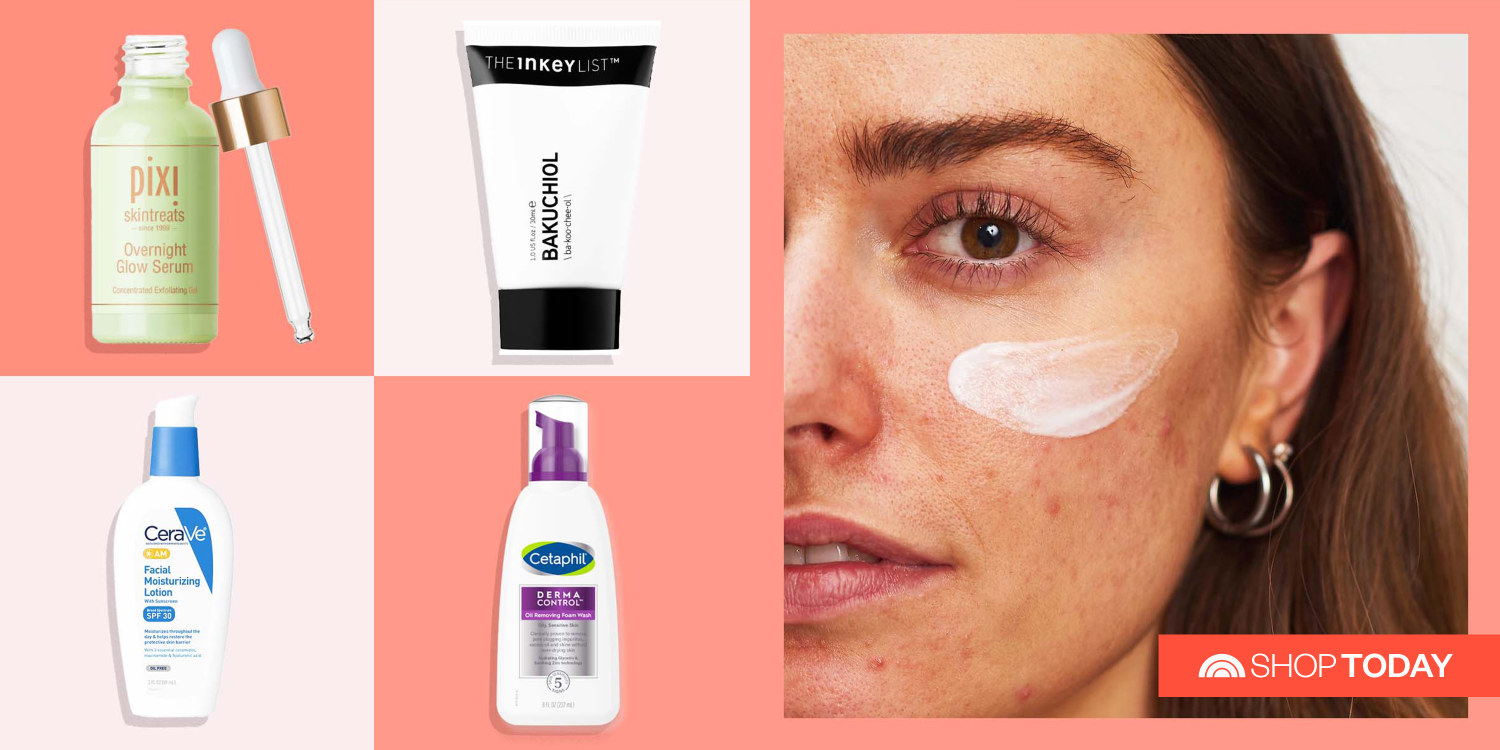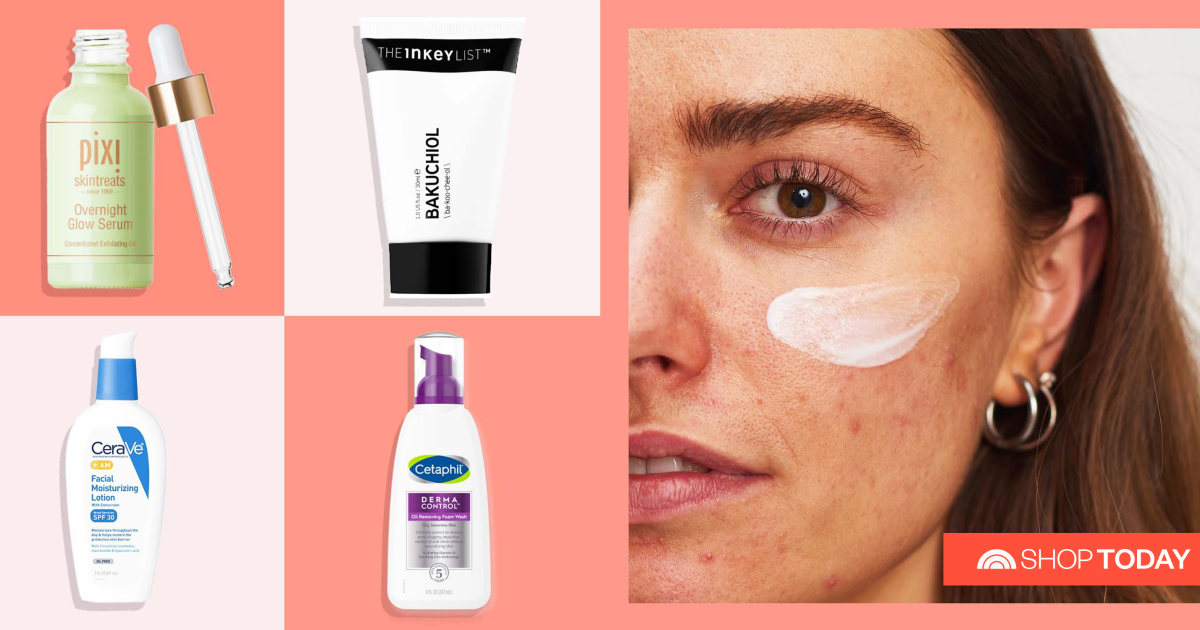A skincare routine for oily skin involves regular cleansing and moisturizing to keep the skin balanced and free of excess oil. Oily skin requires gentle and non-comedogenic products that can minimize oil production while keeping the skin hydrated.
Additionally, exfoliation and the use of oil-absorbing masks can help control shine and prevent clogged pores. Proper sun protection is also crucial for this skin type to prevent inflammation and ensure healthy skin. By following a skincare routine tailored to oily skin, you can keep your complexion looking fresh, matte, and blemish-free.
Understanding Oily Skin
If you have oily skin, a proper skincare routine is essential to control excess oil and maintain a balanced complexion. Start with a gentle cleanser to remove impurities, followed by a toner to tighten pores. Use oil-free moisturizers and non-comedogenic products to keep your skin hydrated without clogging pores.
| Characteristics of Oily Skin | Common Issues Faced by Oily Skin |
| Excessive sebum production, often shiny appearance | Clogged pores lead to acne and blackheads |
| Pores may appear enlarged or more visible | Uneven skin texture and frequent breakouts |
| Prone to develop blemishes and skin irritation | Difficulty in maintaining makeup throughout the day |
Importance Of A Skincare Routine
Skincare routine is essential for maintaining healthy skin, especially for those with oily skin. Oily skin types are prone to breakouts and excess oil production, making it crucial to follow a consistent skincare regimen.
A routine comprising of cleansing, toning, and moisturizing twice daily helps control oil production and keeps pores clean. Choosing products specifically designed for oily skin can help balance sebum production and prevent breakouts.
In addition to regular cleansing, exfoliating once or twice a week is important to remove dead skin cells and unclog pores. This can be done with gentle exfoliants containing ingredients like salicylic acid or fruit enzymes.
It’s also vital to avoid touching your face throughout the day, as this can transfer dirt and bacteria onto your skin. Finally, don’t forget to protect your skin from UV rays by using a broad-spectrum sunscreen daily.
Choosing The Right Products
Choosing the Right Products: For oily skin, it’s essential to use gentle cleansers that effectively remove excess oil without stripping the skin. Look for cleansers with salicylic acid or glycolic acid to help control oil production. Additionally, opt for oil-free moisturizers that are non-comedogenic and mattifying to keep the skin hydrated without adding extra shine. Avoid heavy creams and instead opt for lightweight, gel-based moisturizers that won’t clog pores. Always look for products labeled “non-acnegenic” or “non-comedogenic” to ensure they won’t exacerbate oiliness or cause breakouts.

Daily Skincare Routine
Having a skincare routine for oily skin is important for maintaining a healthy complexion. In the morning routine, start by cleansing your face with a gentle foaming cleanser to remove excess oil. Follow up with a toner containing salicylic acid to control oil production. After that, apply an oil-free moisturizer with SPF to protect your skin from the sun.
For the nighttime routine, begin by using a gentle cleanser to remove makeup and impurities. Next, apply a retinol serum to help control oil and prevent breakouts. Finish off with a lightweight, oil-free night cream to hydrate the skin without clogging pores.
Additional Tips For Oily Skin
For those with oily skin, a well-balanced skincare routine is essential to control excess sebum production and maintain a clear complexion. But in addition to the basics, there are a few extra tips to enhance your oily skin routine:
1. Exfoliation: Regular exfoliation helps remove dead skin cells and unclog pores, preventing blackheads and acne breakouts. Look for gentle exfoliants with ingredients like salicylic acid or glycolic acid.
2. Sun Protection: Despite oily skin, it’s crucial to protect your skin from harmful UV rays. Opt for lightweight, oil-free sunscreens with SPF 30 or higher.
3. Mattifying Products: Incorporate mattifying products into your routine to combat excessive shine. Use oil-free moisturizers, primers, and foundations formulated specifically for oily skin.
4. Blotting Papers: Keep blotting papers or oil-absorbing sheets on hand to instantly control shine throughout the day, without disturbing your makeup.
Remember, consistency is key for oily skin. Stick to your routine and adjust it as needed to maintain a balanced and healthy complexion. Happy skincare!

Professional Advice
Discover professional advice for developing a skincare routine designed specifically for oily skin. Explore effective tips and expert recommendations to achieve a healthy and balanced complexion, free from excess oil and shine.
| Consulting a Dermatologist | Treatment Options |
| Visiting a dermatologist can help you with your oily skin issues. They can offer personalized skincare advice and treatment options. | Common treatment options for oily skin include topical products, like cleansers and moisturizers specifically formulated for oily skin. |
| Prescription medications may also be recommended to manage excessive oil production. Professional treatments such as chemical peels and laser therapy can be effective. | It’s important to follow the advice of your dermatologist closely to achieve the best results for your oily skin. |
Lifestyle Habits To Support Clear Skin
For balanced skin, maintain a healthy diet rich in fruits and vegetables. Drink plenty of water to keep your skin hydrated and clean.
Limit consumption of sugary and greasy foods. Avoid excessive caffeine and alcohol intake as they can worsen oily skin conditions.

Frequently Asked Questions On Skincare Routine For Oily Skin
What Are The Best Ingredients For Oily Skin?
The best ingredients for oily skin include salicylic acid, niacinamide, and hyaluronic acid. These ingredients help to control excess oil and minimize pores.
How Often Should I Wash My Face With Oily Skin?
It’s recommended to wash your face twice a day, once in the morning and once before bed, using a gentle cleanser to remove excess oil and dirt without stripping the skin.
Can I Use Moisturizer For Oily Skin?
Yes, using a lightweight, oil-free moisturizer is important for oily skin. Look for non-comedogenic formulas that provide hydration without clogging pores.
What Sunscreen Should I Use For Oily Skin?
Opt for a sunscreen with a gel or matte finish and oil-free formula to prevent clogged pores. Look for SPF 30 or higher to protect your skin from sun damage.
Conclusion
To summarize, a proper skincare routine is essential for managing oily skin. By following the steps mentioned in this blog post, you can effectively control excess oiliness, reduce acne, and achieve a healthier complexion. Remember to cleanse, exfoliate, use oil-free moisturizers, and incorporate targeted treatments into your routine.
By adopting these practices, you can achieve balanced and radiant-looking skin. Start your journey to clearer skin today!

